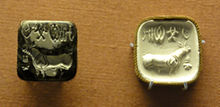Stamp seal
This article includes a list of general references, but it lacks sufficient corresponding inline citations. (December 2011) |

The stamp seal (also impression seal) is a common seal die, frequently carved from stone, known at least since the 6th millennium BC (Halaf culture[1]) and probably earlier. The dies were used to impress their picture or inscription into soft, prepared clay and sometimes in sealing wax.
The oldest stamp seals were button-shaped objects with primitive ornamental forms chiseled onto them.[2] The stamp seals were replaced in the 4th millennium BC by cylinder seals that had to be rolled over the soft clay to leave an imprint.[1] From the 12th century BC the previous designs were largely abandoned in favor of amphora stamps.[3] Romans introduced their signaculum around the first century BC;[3] Byzantine maintained the tradition in their commercial stamps.[4]
In antiquity the stamp seals were common, largely because they served to authenticate legal documents, such as tax receipts, contracts, wills and decrees.
Indus stamp-seal
[edit]
The Indus stamp-seals probably had a different function from the stamp seals of the Minoan civilization, as they typically have script characters, with still undeciphered associations.
Gallery
[edit]-
Stamp seals (bottom row), cylinder seals (top row)
-
Signaculum PRIMIT ("first")
-
An impression of a cast copper-alloy seal matrix of medieval date (14th century AD)
See also
[edit]- Ancient Near Eastern seals and sealing practices
- Bulla (seal)
- Indus script
- LMLK seals from Lachish, ca 700 BCE.
- Scaraboid seal
References
[edit]- ^ a b Brown & Feldman 2013, p. 304.
- ^ Di Palma 2015, p. 21.
- ^ a b Di Palma 2015, p. 24.
- ^ Vikan 1991.
Sources
[edit]- Garbini. Landmarks of the World's Art, The Ancient World, by Giovanni Garbini, (McGraw-Hill Book Company, New York, Toronto), General Eds, Bernard S. Myers, New York, Trewin Copplestone, London, c 1966. Numerous examples of the Cylinder seal; ( 3 ) separate Discussions (only) of "Stamp sealing". No seals, or impressions thereof.
- Yule, Paul (1981). Early Cretan seals: a study of chronology (Marburger Studien zur Vor- und Frühgeschichte, Bd. 4). Mainz: NN. doi:10.11588/diglit.3044.
- Di Palma, Salvatore (2015). The History of Marks from Antiquity to the Middle Ages. Société des écrivains.
- Brown, Brian A.; Feldman, Marian H. (2013). Critical Approaches to Ancient Near Eastern Art. Walter de Gruyter. ISBN 9781614510352.
- Vikan, Gary (1991-01-01). "Stamps, Commercial". The Oxford Dictionary of Byzantium. Oxford University Press. doi:10.1093/acref/9780195046526.001.0001. ISBN 978-0-19-504652-6.
External links
[edit]- Detail of Stamp seal-Medium Res;
- Article mcclungmuseum.utk.edu—Jar, and associated Stamp Seal
- Gazelle Head, Stamp seal – at the Oriental Institute of Chicago.




